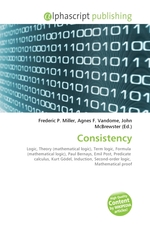Consistency
Frederic P. Miller, Agnes F. Vandome, John McBrewster
бумажная книга
In logic, a consistent theory is one that does not contain a contradiction. The lack of contradiction can be defined in either semantic or syntactic terms. The semantic definition states that a theory is consistent if it has a model; this is the sense used in traditional Aristotelian logic, although in contemporary mathematical logic the term satisfiable is used instead. The syntactic definition states that a theory is consistent if there is no formula P such that both P and its negation are provable from the axioms of the theory under its associated deductive system. If these semantic and syntactic definitions are equivalent for a particular logic, the logic is complete. The completeness of sentential calculus was proved by Paul Bernays in 1918 and Emil Post in 1921, while the completeness of predicate calculus was proved by Kurt Godel in 1930, and consistency proofs for arithmetics restricted with respect to the induction axiom schema were proved by Ackermann (1924), von Neumann (1927) and Herbrand (1931). Stronger logics, such as second-order logic, are not complete.
Данное издание не является оригинальным. Книга печатается по технологии принт-он-деманд после получения заказа.


